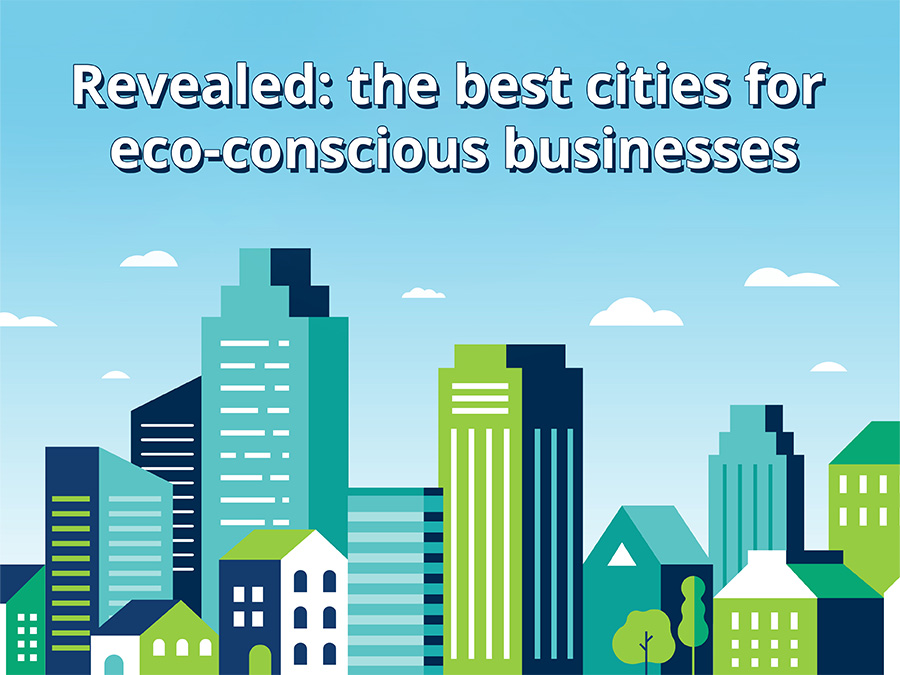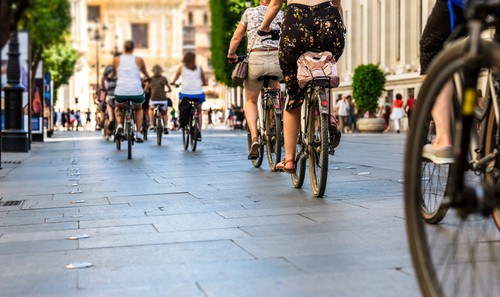With the world becoming ever more environmentally conscious, individuals and businesses across the globe are trying to make sustainability a higher priority in their day-to-day decision-making. But which cities across the world are the best for eco-conscious businesses?
At Solopress, we are dedicated to supporting and fostering the transition to a green economy, and our Solopress Green range allows our customers to buy high-quality carbon-neutral print. That’s why we have embarked on this research to identify the cities around the world that are most conducive for eco-conscious businesses to thrive.
Standards for Eco-Conscious Cities and Businesses
Our study looks at the top 50 most sustainable cities in the world. We evaluated these cities on a variety of metrics including their sustainable development ranking, pollution score, air quality, the distance of mapped cycling routes, and the number of ‘B corporations’ in the country.
A ‘B corporation’ is a company that meets certain social and environmental responsibilities set by an organisation called B Lab. It’s a high bar, and companies wishing to be known as B corporations must pass a rigorous assessment, amend the legal framework of their business and commit to two demanding pledges: the B Corp Agreement and the Declaration of Interdependence.
When we came to look at the UK cities investing the most in sustainable alternatives, we tapped into Solopress’ own unique in-house data to determine the UK cities where businesses are investing the most in the Solopress Green range.
The Best Global Cities for Eco-Conscious Businesses
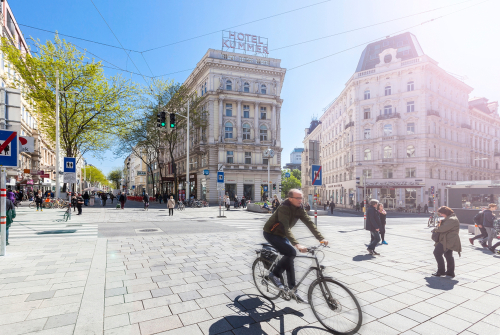
Our research identified several cities across the world that standout for eco-conscious companies. The top three cities, Vienna, Stockholm, and Copenhagen, each showcase impressive scores in sustainable development ranking, low pollution, excellent air quality and extensive cycling routes.
| Rank | City | Country | Sustainable development ranking | Pollution score | Air quality | Distance of mapped cycling routes (km) | No. of B corporations |
| 1 | Vienna | Austria | 82.3 | 15.5 | 84.6 | 2,868,408 | 154 |
| 2 | Stockholm | Sweden | 85.2 | 18.4 | 84.4 | 337,343 | 180 |
| 3 | Copenhagen | Denmark | 85.6 | 21.5 | 81.9 | 348,862 | 228 |
| 4 | Edinburgh | United Kingdom | 80.6 | 28.1 | 74.6 | 205,019 | 1,765 |
| 5 | Munich | Germany | 82.2 | 25 | 74.8 | 1,438,715 | 490 |
| 6 | Boston | United States | 74.6 | 30.8 | 74.5 | 95,373 | 2,496 |
| 7 | Seattle | United States | 74.6 | 33.9 | 73.9 | 258,218 | 2,496 |
| 8 | Amsterdam | The Netherlands | 79.9 | 25.5 | 76.3 | 1,063,403 | 487 |
| 9 | Oslo | Norway | 82.4 | 21.6 | 77.3 | 613,920 | 113 |
| 10 | Tampa | United States | 74.6 | 34.3 | 75.5 | 8,969 | 2,496 |
In particular, Vienna stands out for having the second-best air quality and the second-longest cycling routes. Stockholm impresses with the second-highest sustainable development ranking and the second-lowest levels of pollution. Copenhagen tops the chart for the sustainable development ranking, boasting the fourth lowest levels of pollution and the fourth best air quality.
Edinburgh goes the extra Royal Mile
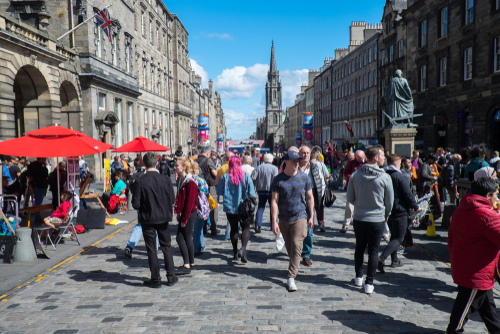
Edinburgh stands as a green beacon within the United Kingdom. Achieving a notable sustainable development ranking of 80.6, it’s a city that’s managed to successfully intertwine urban development and environmental integrity. Edinburgh’s significant network of cycling routes, spanning over 205,019 kilometres, may also play a key role in reducing its pollution score to 28.1 and maintaining an impressive air quality index of 74.6. Additionally, Edinburgh’s burgeoning community of 1,765 B corporations illustrates the city’s commitment to balancing economic growth with sustainability.
Boston backs B Corps
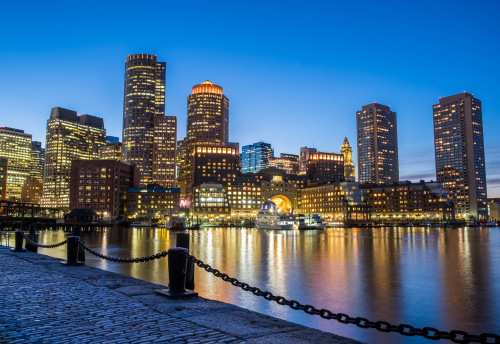
On the other side of the Atlantic, Boston leads the way in the United States. Despite being a bustling metropolis, Boston holds a sustainable development ranking of 74.6 and boasts an air quality index of 74.5. Furthermore, the city’s network of cycling routes encourages eco-friendly commuting, reducing pollution and enhancing the city’s liveability. Notably, Boston is home to an astonishing 2,496 B corporations, signalling a robust culture of sustainability within its business ecosystem.
The Worst Global Cities for Eco-Conscious Businesses
On the other side of the spectrum, several cities present significant challenges for eco-conscious businesses.

Marseille, for example, shows the highest pollution score of all cities analysed, over four times higher than Vienna’s score, and has the worst air quality.
| Rank | City | Country | Sustainable development ranking | Pollution score | Air quality | Distance of mapped cycling routes (km) | No. of B corporations |
| 1 | Marseille | France | 81.24 | 71.88 | 30.5 | 26,849 | 692 |
| 2 | Los Angeles | United States | 74.55 | 66.45 | 37.44 | 71,978 | 2,496 |
| 3 | Barcelona | Spain | 79.9 | 65.22 | 36.32 | 28,480 | 453 |
| 4 | Paris | France | 81.24 | 63.95 | 33.75 | 966,347 | 692 |
| 5 | Macao | China | 72.38 | 62.47 | 50 | 13,510 | 214 |
Similarly, Los Angeles has the second worst pollution score, while the United States ranks as having one of the lowest scores in the sustainable development ranking. Barcelona has the third worst pollution levels and ranks 11th from the bottom for its km of mapped cycling routes.
UK Cities Investing the Most in Sustainable Alternatives
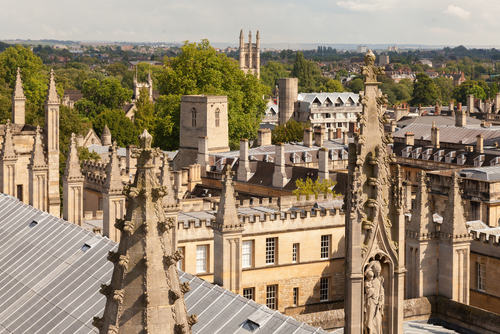
The study identified several cities in the UK that are making notable strides in adopting sustainable alternatives. We determined this by taking the 50 UK cities with the highest number of businesses that buy from Solopress altogether. We then ranked these cities’ highest to lowest based on the percentage of customers that choose to buy from the Solopress Green range, a range of eco-friendly products whose production is carbon neutral.
| Index | Area | Total Customers | Solopress Green Customers | Green % |
| 1 | Oxford | 250 | 33 | 13.20% |
| 2 | Cambridge | 396 | 46 | 11.62% |
| 3 | Bristol | 602 | 63 | 10.47% |
| 4 | South Oxfordshire | 239 | 24 | 10.04% |
| 5 | Shropshire | 281 | 28 | 9.96% |
| 6 | Cornwall | 520 | 49 | 9.42% |
| 7 | Edinburgh | 496 | 45 | 9.07% |
| 8 | Bath and North East Somerset | 254 | 23 | 9.06% |
| 9 | Kent | 378 | 34 | 8.99% |
| 10 | Norfolk | 537 | 48 | 8.94% |
Oxford leads with 13.20% of businesses investing in the Solopress Green range, followed by Cambridge with 11.62%. Here’s a deeper look into why it is that these two particular cities stand out:
The Oxbridge Effect
Oxford and Cambridge, recognized globally for their universities, are also leaders in sustainability and environmental science research. This atmosphere of learning seems to incubate green businesses and initiatives. With a strong focus on sustainable transportation, both cities encourage cycling, with Cambridge known as the UK’s “Cycling Capital” and Oxford implementing the ‘Oxford Cycling City‘ project to expand cycling routes.
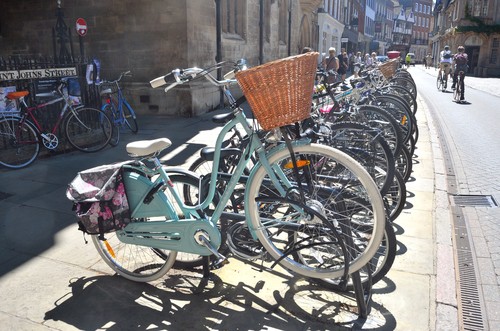
Significant strides in clean energy have also been made in both cities. Oxford’s Energy Superhub Oxford project supports the city-wide switch to electric vehicles, while Cambridge’s climate change strategy sets ambitious renewable energy and emissions reduction targets.
In policy terms, both cities have demonstrated a commitment to sustainability leadership. Oxford aims to become carbon neutral by 2030, even considering the “15-minute city” concept. Similarly, Cambridge’s ‘Cambridge Sustainable City‘ program promotes energy efficiency, renewable energy use, and sustainable transportation.
Steps Towards Sustainability
Becoming a more sustainable business is a journey and every step counts. There are several actions companies can take, and here are a few initial steps:
-
Reduce Energy Consumption
Invest in energy-efficient appliances and consider switching to a renewable energy supplier.
-
Minimise Waste
Implement waste management practices to reduce, reuse, and recycle.
-
Consider Sustainable Sourcing
Source materials and services from sustainable and ethical suppliers.
-
Promote a Green Company Culture
Encourage employees to engage in eco-friendly practices in the office.
-
Offset Your Carbon Footprint
Consider participating in carbon offsetting initiatives, like the Solopress Green range, which achieves neutrality via ClimatePartner’s global projects.
This study illustrates that while some cities are making impressive strides towards eco-conscious practices, others have significant work to do. However, regardless of location, every business has the opportunity and responsibility to play their part in the drive towards a sustainable future.
Methodology and Sources:
This campaign was created by taking a seedlist of 50 of the most sustainable cities worldwide. We then ranked these cities based on metrics such as; Sustainable development ranking (by country), The cost to start a business index (by country), Pollution score (by city), Air quality (by city), Distance of mapped cycling routes (by city) and Number of B corporations (by country). Each city was given a score on each of these metrics and ranked in accordance to this.
Solopress’s unique in-house data gave us the UK cities where businesses are investing the most in sustainable alternatives. Our initial sample list was the 50 UK cities with the highest number of businesses that buy from Solopress altogether. We then ranked these cities highest to lowest based on the percentage of customers that choose to actively shop in Solopress’ green range (which ultimately allows customers to offset their CO2 emissions with every purchase they make).
- Seedlist – Arcadis
- Sustainable development ranking – Sustainable Development Report
- Pollution score and air quality – Numbeo
- Distance of mapped cycling routes – Bikemap
- Number of B corporations – B Corporation
In-house Solopress data from May 2023.

